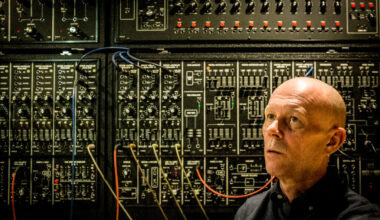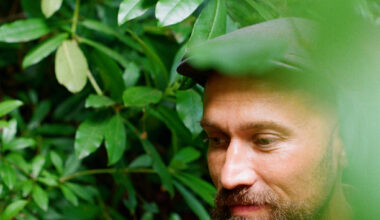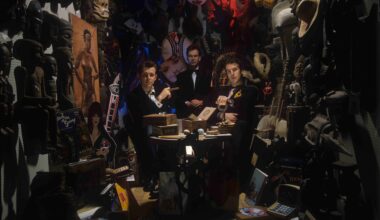By night he’s electronica artist Schwarzmodul, by day he’s LA-based film/TV composer, CATO. Dip into a world you never knew existed…
Meet Cato, whose name you won’t know, but you will almost certainly know his work. He’s scored and written original music for over 20 feature films and documentaries, including crime flick ‘Smokin’ Aces’ and 2006’s neo-noir ‘Mini’s First Time’. Along with fellow composer Jon Brion and “an unnamed extremely influential rock band”, he worked on ‘Stone’ starring Robert De Niro and Milla Jovovich (”They needed the ‘sound of God’,” he laughs).
So far so good. Here’s the really interesting bit though. He’s also composed, produced and remixed music for hundreds of film trailers film trailers including Denzel Washington’s Oscar-winning ‘Fences’, ‘The Iron Lady’ starring Meryl Streep, ‘Star Trek Beyond’, ‘Game Of Thrones’ and most recently, with a very respectful nod to Vangelis, his work adorns the ‘Blade Runner 2049’ trailer.
Call us naïve, but we assumed the headline composer, the person engaged to create the original soundtrack, would be the responsible for all the film’s music, trailers and all. Nope. The creation of film trailers happens in an environment largely separate from the actual film production and is run by studio marketing departments and trailer advertising agencies, also known as trailer houses.
“There’s not necessarily that much interaction between the two worlds,” explains Cato, “although for bigger or highly anticipated productions like ‘Blade Runner 2049’, the director and top level producers would be more involved, making sure the trailers really reflect their vision for the film.”
As is usually the case, there is also more than one piece of music in the trailer.
“With ‘Blade Runner 2049’ I was able to work with the themes from the original score and produce my own take on it,” he explains. “But the ending piece is by someone else. It’s fairly easy to hear where my music ends and the other track starts.”
Most of this work all happens before the film’s main composer is even on board and it is, apparently, very rare for a score composer to also pen the trailer music.
“Composing for films and composing for trailers are two different, albeit related, disciplines and not many composers work in both worlds, like I do,” he says.
So how do you get a gig like this? It’s encouraging to hear the path is one well trodden. Cato was born and raised in Norway, his father was an artist and art director and his mother was artistically inclined too, so creative pursuits were encouraged in his home.
“I got into synths at a fairly early age, inspired by the likes of Klaus Schulze, Tangerine Dream, DAF, Suicide, Cabaret Voltaire and Throbbing Gristle,” he says.
He’d tear apart old radios and experiment with tape recorders and tape loops, and by the time he was in his late teens he was in a steady stream of experimental electronic outfits.

“I was less interested in the musical establishment, but I had some brief experiences in the mainstream as the ‘guy with the synths’,” he says. “Watching the original ‘Blade Runner’ had a huge impact on me as far as wanting to start writing music for film. It showed me that it was possible to do this without an orchestra. I was already a fan of Vangelis, but the combination of his music and that amazing film just blew me away.”
He always knew he wanted to make a living in music one way or another, and, while it is possible to get into TV and film scores no matter where you live, it is going to help if you live close to the action. After some years working with studio equipment and electronic instrument companies in Europe, Cato was offered the chance to work for a company in LA.
“If you want to work on bigger projects it’s probably better to be located in London, New York or LA,” he admits. “And that job helped me get one step closer to doing what I wanted to be doing.”
His time as an electronica artist (as schwarzmodul he’s just released tracks on LA’s Track Number label, and has collaborated with Robot Koch on his releases through the Berlin-based Monkeytown label) ensured he was busy honing his sound instead of waiting tables while he worked to get a foot in the door.
“You go with the flow and embrace the opportunities you manage to get,” says Cato. “Writing music for trailers is a very specialised pursuit, and one that I learned after having spent years as an electronica artist and a film/television composer. Trailers usually have many pieces of music/sound design either created or licensed for it, sometimes they’re just a few seconds long. So what I contributed to most of the hundreds of trailers that feature my work is not at the level of what I did for the ‘Blade Runner 2049’ trailer which, to me, was a dream gig considering my love for the original movie and the score by Vangelis.”
You’d imagine that sort of job doesn’t just land on your plate out of the blue. You clearly need to be at a certain level…
“I got the opportunity through the relationships I’ve built over the years I’ve spent in the trailer music business,” he admits. “On a production as high profile and anticipated as this, you’ll have name electronica artists being asked to submit, so it’s going well beyond the world of trailer music. There’s a level of trust involved, but there are absolutely no guarantees that your work will end up in the finished trailer. It’s all done on spec.”
Which sounds like a proper seat of the pants way of working?
“Writing music for trailers is a high pressure, take no prisoners, very fast-paced business,” says Cato. “If you have found that it’s for you, then you just take your punches and move on to the next one. No complaints.”






